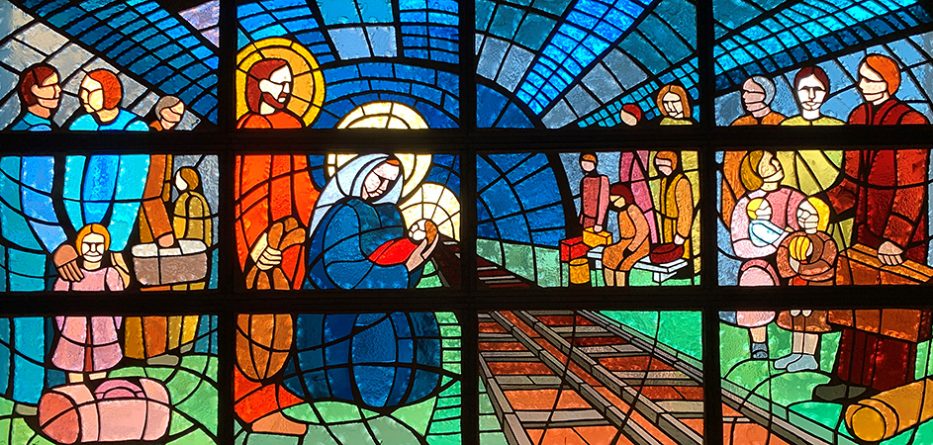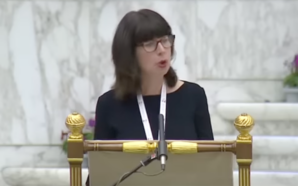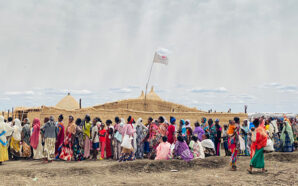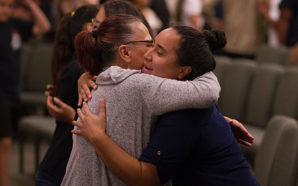3rd Sunday of Easter
1 May 2022
Readings: Acts 5:27-32, 40-41; Psalm 29; Apocalypse 5:11-14; John 21:1-14
Today’s gospel comes from Chapter 21 of John’s gospel, the chapter added later to the original gospel, a chapter containing an added appearance of the Risen Jesus. Here we are in the Easter season hearing daily and weekly accounts of the Resurrection and of the witness being given by the disciples recharged with energy and courage to take on the civil and religious authorities, proclaiming the power of their Risen Lord, declaring in the Acts of the Apostles: ‘Obedience to God comes before obedience to men’. ‘They left the Sanhedrin glad to have had the honour of suffering humiliation for the sake of the name.’
Listen at https://soundcloud.com/frank-brennan-6/homily-1522
For us Australians, these repeated themes are against the backdrop of emergence from the pandemic, the shocking uncertainty of the Russian war in Ukraine, and a lacklustre federal election campaign in which the major parties are going to great pains to espouse anything but selfless ideals, appealing to the base fears and material hopes for ongoing prosperity and security enjoyed by the majority of voters regardless of the cost to others. The sort of backdrop that provides quite a contrast to the energy and courage of the disciples.
Simon Peter says, ‘I’m going fishing.’ It’s as if the past three years of following Jesus are now being brought to a definitive close. It’s time to get back to business as usual. It’s time for the fisherman to get back to fishing. The other six disciples with him have no better idea. They have no better offer. They say, ‘We’ll come with you.’ And to reinforce the humdrum of it all, they pull out on to the water and stay there all night, catching nothing. It’s a pretty sterile humdrum existence after all that’s gone on these Easter days.
At first light, Jesus appears on the shore. He tells them to drop their net again, and they bring in a great haul of fish. He invites them to breakfast. He does not need any of their catch. There are lots of fish in the net – in fact, 153 of them. Surprisingly the net does not break. He has already got fish cooking on the fire. With eucharistic overtones, he takes the bread and gives it to them, and the same with the fish. The Risen Lord is present. He makes a difference. He reveals himself.
Usually during federal elections, I switch off and withdraw from public disputation. During the week I was asked to support a statement by faith leaders supporting refugees living in our community who can obtain only temporary visas, having to renew their visas every three years, or five years if they are lucky, and always being banned from sponsoring their family members to join them.
I felt impelled to add my name to the call by faith leaders including Archbishop Mark Coleridge who is the President of the Australian Catholic Bishops Conference and Bishop Vincent Long, Chair of Catholic Bishops Commission for Social Justice, Mission and Service. The faith leaders have rightly said: ‘These TPVs serve no public policy purpose and have lost community support since their introduction two decades ago. Our pastoral knowledge is of people who have been living with stressful insecurity on TPVs in communities around Australia. We hear their prayers and know their fears. Having sought refuge, they just want to belong and contribute. With their families and friends, they are part of community groups and neighbourhoods. Many have found jobs, work hard, pay their taxes, and have embraced Australia as their home. Like generations of migrants and refugees before them, this group will become an integral part of the Australian story….Like generations of migrants and refugees before them, this group will become an integral part of the Australian story.’[1]
This is the fourth federal election in a row when our national leaders have thought it necessary to engage in a rush to the bottom pledging tough measures against asylum seekers trying to reach Australia by boat. And yet there have been no boats arrive since the last election. Back in 2013, Kevin Rudd pledged offshore detention for these asylum seekers with no prospect of ever settling in Australia. And Tony Abbott pledged to stop the boats, turning them back to Indonesia.[2]
Now in 2022, Scott Morrison and Anthony Albanese are singing from the same hymn sheet pledging to turn back the boats. Prior to the 2013 election, an expert panel including Retired Air Chief Marshal Sir Angus Houston, one time Chief of the Australian Defence Forces, and Professor Michael L’Estrange, one time head of John Howard’s Cabinet Office, had ruled out turnbacks. They found that ‘the conditions necessary for effective, lawful and safe turnback of irregular vessels carrying asylum seekers to Australia are not currently met’[3]. Neither Mr Morrison nor Mr Albanese sees any need to tells us how Houston and L’Estrange got it wrong, or how things have changed. The boats have been stopped. Since the 2013 election, 873 people (including 124 children) seeking asylum on 38 vessels have been returned to their country of departure. Why is it so wrong or unreasonable to demand of our political leaders that they tell us how it is legal and safe to turn back these boats?
With no boats coming, and with measures in place to turn back any boat that might set out from Indonesia, why the need for ongoing punitive measures against those refugees living amongst us who previously came by boat? Surely they should be permitted to get on with their lives. This is the one and only significant difference of policy between the major parties. Labor says: ‘Temporary Protection Visas place refugees in an ongoing State of uncertainty and prevent meaningful settlement, creating hardship for refugees and denying Australia the benefit of their contribution. Labor will abolish Temporary Protection Visas and Safe Haven Enterprise Visas and transition eligible refugees onto permanent visa arrangements.’[4]
The Government continues to state: ‘TPV holders are not eligible to propose relatives through the Humanitarian Program. This is in line with the Government’s Operation Sovereign Borders policy that no one who comes to Australia illegally by boat will settle here – established to safeguard vulnerable people from exploitation by people smugglers, prevent the loss of life at sea, and ensure the integrity of Australia’s borders. These settings have successfully stemmed the flow of people smuggling ventures to Australia and saved countless lives at sea.’[5]
But if the boats can be legally and safely stopped, why the need for this ongoing punishment of proven refugees wanting to get on with their lives? The statistics demonstrate the unnecessary harshness of this policy. There are over 20,000 of these proven refugees whose lives are left on hold. They have to keep applying for a new visa every three years, or if they are lucky, every five years. On 14 February 2022, the government admitted to Parliament: ‘As at 31 January 2022, 6,787 persons have applied for a subsequent Temporary Protection (subclass 785) visa or Safe Haven Enterprise (subclass 790) visa’ and that ‘less than five persons have been refused a subsequent Temporary Protection (subclass 785) visa or Safe Haven Enterprise (subclass 790) visa.’[6]
Whoever wins the election, it is time for the government to give a clear account to the Parliament on the legality and safety of boat turnbacks. Until such clarification is given, there is good reason to hold one’s nose as one casts a vote for either of the major political parties who are now committed to such a policy without bothering to tell us before polling day how the turnbacks are both legal and safe. The major parties have made the political calculation that its better to incur the moral wrath of voters concerned about the legality and safety of boat turnbacks rather than the isolationist rage of the voters who’ll favour any action against boat people whether it be illegal or unsafe.
When deciding which major political party should form government, the conscientious voter needs to consider many complex issues. When it comes to refugee policy, the voter is now assured that there is little, if any, difference between the major political parties on refugee policy. But there is one major point of distinction. The Labor Party favours permanent visas for all proven refugees living in our midst, being convinced that they can still maintain the security of our borders and the good order of our migration program. And that is a good thing. The Liberal Party maintains a commitment to punishing temporary visa holders without the prospect of family reunion, and with increased processing costs, despite the boats having stopped.
Admittedly there are many other issues to consider before casting one’s vote. But the plight of the 20,688 refugees issued with temporary visas since 2013 deserve our consideration as we sit down to the eucharistic breakfast while He takes the bread, breaks it, and gives it to us, and the same with the fish. I hope other faith leaders will sign on to our request that needless, punitive TPVs be dropped from the armoury of border protection.
At night there are tears, but joy comes with dawn.
The Lord listened and had pity.
The Lord came to my help.
For me you have changed my mourning into dancing;
O Lord my God, I will thank you forever.
[1] See statement of Faith Leaders, 29 April 2022 below
[2] This Australian approach has been causing increasing concern to the UNHCR. See http://www.against-inhumanity.org/2022/04/29/the-cruelty-of-containment-how-the-worlds-wealthiest-states-are-using-inhumane-and-illegal-methods-to-undermine-the-right-to-asylum/
[3] Report of the Expert Panel on Asylum Seekers, August 2012, Recommendation 19, p. 17
[4] https://alp.org.au/media/2594/2021-alp-national-platform-final-endorsed-platform.pdf
[5] House of Representatives, Hansard, 14 February 2022, p.543
[6] These figures were tabled by the government in response to Questions placed on Notice by Senator Nick McKim in the Senate Standing Committee on Legal and Constitutional Affairs Additional Budget Estimates on 14 February 2022
Fr Frank Brennan SJ is the Rector of Newman College, Melbourne, and the former CEO of Catholic Social Services Australia (CSSA). He has been appointed a peritus at the Fifth Plenary Council of the Australian Catholic Church.
Statement from Australian faith leaders
We urge our political leaders to reconsider the needs and futures of people who are still on Temporary Protection Visas. It is time to offer people on TPVs permanent protection.
We raise this matter cautiously, mindful of how fraught discussion of such matters has been in previous Federal Elections.
But we must speak because compassion and care for others are universal values shared by all major faith traditions. As people of faith, we bring this perspective to our consideration of all things, including public policy around protecting refugees and people seeking asylum.
Hence, we advocated for and welcomed recent steps to release most Medevac refugees from hotel detention; to move forward with the New Zealand resettlement plan; and to increase the number of Afghan refugees being offered protection.
We speak now, relatedly, out of deep concern about the current division between the two major parties on the issue of temporary protection visas.
These TPVs serve no public policy purpose and have lost community support since their introduction two decades ago.
Our pastoral knowledge is of people who have been living with stressful insecurity on TPV’s in communities around Australia. We hear their prayers and know their fears. Having sought refuge, they just want to belong and contribute. With their families and friends, they are part of community groups and neighborhoods. Many have found jobs, work hard, pay their taxes, and have embraced Australia as their home.
COVID-19 has required many rethinks and reminded us all of what is truly important in life. There is a wonderful opportunity for our political leaders to now embrace a group of people who want to put down roots, build lives and work hard for Australia’s best future. Like generations of migrants and refugees before them, this group will become an integral part of the Australian story.
It is as a voice for the relatively voiceless that we are moved to write to Prime Minister Scott Morrison and Opposition Leader Anthony Albanese in support of a more unifying and compassionate national policy on this important matter.
Signed by:
Sister Brigid Arthur, The Brigidine Asylum Seekers Project
Bishop Paul Barker, Anglican Diocese of Melbourne
Dr Greg Barton, Deakin University
Dr Makarand Bhagwat, President Hindu Council
Dr Graeme Blackman, President, Victorian Council of Churches
Tamara Domicelj, Country Director Jesuit Refugee Service (JRS) Australia, co-Chair of the Catholic Alliance for People Seeking Asylum
Bishop Genieve Blackwell, Anglican Diocese of Melbourne
Revd Sandy Boyce, Executive Officer, Victorian Council of Churches
Fr. Frank Brennan SJ, Rector Newman College
The Hon. Diana Bryant, AO,QC
Revd David Bullock, Director of Mission and Ministries, Baptist Union of Victoria
Professor Des Cahill, Religions for Peace Australia
Dr. Leslie Cannold, author and ethicist
The Most Reverend Geoff Smith, Archbishop of Adelaide and Primate of the Anglican Church of Australia
Mr Tim Cartwright, APM and Advisory Board of the Australian Intercultural Society
Revd Debra Saffrey-Collins, Head of Chaplaincy and Diocesan Partnerships, Brotherhood of St. Laurence
Revd Tim Costello, Executive Director of Micah Australia
Dr Diana Cousens, Vice Chair, Buddhist Council of Victoria
Most Reverend Vincent Long Van Nguyen, Bishop of Parramatta and Chair of Catholic Bishops Commission for Social Justice, Mission and Service
Archbishop Mark Coleridge, Archbishop of the Archdiocese of Brisbane
Bhakta Dasa, International Society for Krishna Consciousness
Imam Alaa Elzokm, Imam of Heidelberg Mosque
Adel Salman, President Islamic Council of Victoria
Celia Andrews, Anglican, Perth
Julie Edwards, Chief Executive Officer Jesuit Social Services, co-Chair of the Catholic Alliance for People Seeking Asylum
Dr Adrian Evans, Emeritus Professor of Law, Monash University
Ms. Wendy Francis, on behalf of Australian Christian Lobby
Rabbi Ralph Genende
Revd Scott Holmes, Chaplain at the Brotherhood of St Laurence
Bishop Philip Huggins, Australian Centre for Christianity and Culture
Mr. Ahmet Keskin, Executive Director of the Australian Intercultural Society
The Very Revd Dr Andreas Loewe, Dean of Melbourne
Dr. Mohamed Mohideen, Islamic Council of Victoria
Bishop Kate Prowd, Anglican Diocese of Melbourne
Dr Susan Riley, Former Deputy Lord Mayor, City of Melbourne
Revd Helen Summers, Director, The Interfaith Centre of Melbourne
Jasbir Singh Suropada, Chairperson, Sikh Interfaith Council of Victoria
Barney Zwartz, Senior Fellow of the Centre for Public Christianity
Harold Zwier, Jewish community
Brenton Jayatilaka, Anglican Parish of City on a Hill
Revd Gemma Baseley, Anglican Diocese of Perth, Social Responsibility Committee
Br Peter Carrroll FMS, President Catholic Religious Australia
Shaykh Mohammad Ramzan, President Victorian Islamic Commission of Research, Fatwa and Charity
Rev. Charles Balnaves, PP








